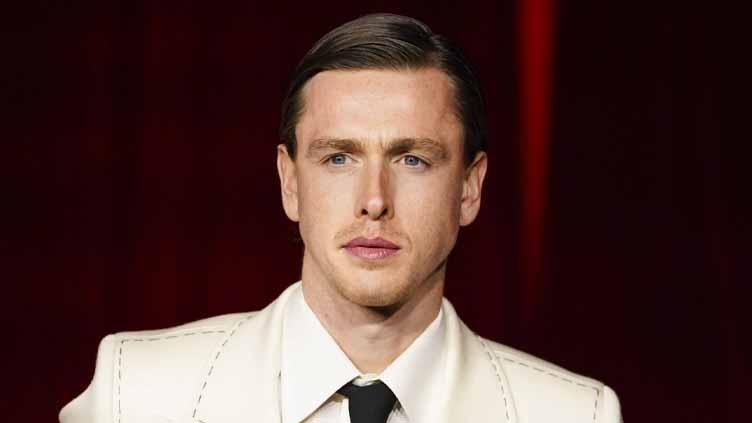Harris Dickinson toys with ambiguity in 'Babygirl,' and keeps a secret from Nicole Kidman

Entertainment
“She helped me break the ice a bit,” Dickinson said
NEW YORK (AP) – Harris Dickinson was nervous to approach Nicole Kidman.
This would not necessarily be notable under normal circumstances, but the English actor had already been cast to star opposite her in the erotic drama “Babygirl,” as the intern who initiates an affair with Kidman’s buttoned-up CEO. They’d had a zoom with the writer-director Halina Reijn, who was excited by their playful banter and sure that Dickinson would hold his own. And yet when he found himself at the same event as Kidman,shyness took over. He admitted as much to Margaret Qualley, who took things into her own hands and introduced them.
in a recent interview with The Associated Press.
On set would be an entirely different story. Dickinson might not be nearly as “puckishly audacious” as his character Samuel but in the making of “Babygirl,” he, Kidman and Reijn had no choice but to dive fearlessly into this exploration of sexual power dynamics, going to intimate, awkward, exhilarating and meme-able places. It’s made the film, in theaters Christmas Day, one of the year’s must-sees.
“There was an unspoken thing that we adhered to,” Dickinson said. “We weren’t getting to know each other’s personal lives. When we were working and we were the characters, we didn’t veer away from the material. I never tried to attach all of the history of Nicole Kidman. Otherwise it probably would have been a bit of a mess.”
His is a performance that reconfirms what many in the film world have suspected since his debut seven years ago as a Brooklyn tough questioning his sexuality in Eliza Hittman’s “Beach Rats”: Dickinson is one of the most exciting young talents around.
Dickinson, 28, grew up in Leytonstone, in East London — the same neck of the woods as Alfred Hitchcock. Cinema was in his life, whether it was Christopher Nolan’s “Batman” films at the local multiplex or venturing into town to see the more social realist films of Mike Leigh and Ken Loach.
“Working class cinema interested me,” he said. “People around me that represented my world.”
Appropriately, his entry into making art started behind the camera, with a comedy web series he made as a kid, which he now describes as “really bad spoofs” of films and shows of the time. But things started to really click when he began acting in the local theater.
“I remember feeling invigorated by it and accepted,” he said. “I felt myself for the first time and felt able to express myself in a way where I didn’t feel vulnerable and I felt alive and ignited by something.”
At around 17, someone suggested that he should give acting a try professionally. He hadn’t even fully understood that it was a career possibility, but he started auditioning. At 20, he was cast in “Beach Rats” and, he said, just “kept going.” Since then, he’s gotten a wide range of opportunities in films both big, including “The King’s Man,” and small. He’s captivated as a male model in Ruben Östlund’s Cannes-winning “Triangle of Sadness,” an estranged father to a 12-year-old in Charlotte Regan’s “Scrapper,” an actor bringing an ex-boyfriend to life in Joanna Hogg’s “The Souvenir Part II,” the charismatic, tragic wrestler David Von Erich in Sean Durkin’s “The Iron Claw” and a soldier in Steve McQueen’s “Blitz.”
Since its premiere at the Venice Film Festival earlier this year, the film has led to some surprisingly direct conversations with audiences spanning generations. But that, Dickinson understood, was what Reijn wanted.
“She really wanted to show the ugliness and the awkwardness of these things, of these relationships and sex,” he said. “That sort of fumbly version and the performative version of it is way more interesting, to me at least, than the kind of fantasized, romanticized, sexy thing that we’ve seen a lot.”
Dickinson recently stepped behind the camera again, directing his first feature film under the banner of his newly formed production company. Set against the backdrop of homelessness in London, “Dream Space” is about a drifter trying to assimilate and understand his cyclical behavior.
The film, which wrapped earlier this year, has given him a heightened appreciation for just how many people are indispensable in the making of a film. He’s also started to understand that “acting is just being able to relax.”
“When you’re relaxed, you can do stuff that is truthful,” he said. “That only happens if you’ve got good people around you: The director that creates the good environment. The intimacy coordinator facilitating a safe space. A coworker in Nicole encouraging that kind of bravery and performance with what she’s doing.”
Dickinson did eventually get to the point where he managed to ask Kidman questions about working with Stanley Kubrick and Lars Von Trier. But he also kept one shattering possibility between himself and his director.
“There is a world in which Samuel doesn’t even exist. He’s just a sort of a device or a figment for her own story. And I like that because it kind of means you can take the character into a very unrealistic realm at times and be almost like a deity in the story,” Dickinson said. “We didn’t talk about it with Nicole.”


